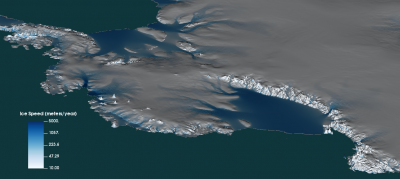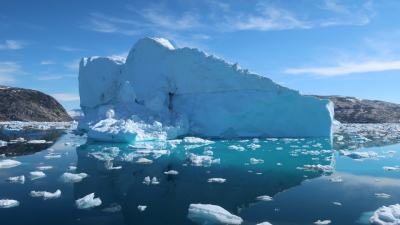- Home
- Discover
- Media Releases
- Media Releases 2021
- sea level
Limit global warming to 1.5°C and halve the land ice contribution to sea level this century
The study uses a large number of computer models combined with statistical techniques, making predictions for the latest socio-economic scenarios to inform the Intergovernmental Panel on Climate Change's Sixth Assessment report which will be published later this year. To determine the future mass losses of mountain glaciers, the work of ten international research groups using a total of eleven different models was coordinated in Bremen. "This study incorporates the combined expertise of the global community of glacier modelers," explains Ben Marzeion.
The research predicts that if we limit global warming to 1.5°C, Greenland ice sheet losses would reduce by 70%, and glacier losses by half, compared with current emissions pledges. For Antarctica, the predictions are the same for different emissions scenarios, because it is currently unclear whether snow falling in the cold interior of the ice sheet will offset melting at the coasts. However, under a 'pessimistic' storyline, with much more melting than snowfall, Antarctic ice losses could be five times larger.
Dr Tamsin Edwards, Director of the King’s Climate Hub, said: “Ahead of COP26 this November, many nations are updating their pledges to reduce greenhouse gas emissions under the Paris Agreement. Global sea level will continue to rise, even if we halt all emissions now, but our research suggests we could limit the damage: if pledges were far more ambitious, central predictions for sea level rise from melting ice would be reduced from 25 cm to 13 cm in 2100, with a 95% chance of being less than 28 cm rather than the current upper end of 40 cm. This would mean a less severe increase in coastal flooding.”
Glaciers and ice sheets are currently responsible for around half of global sea level rise, with most of the rest arising from expansion of the oceans as they warm. Previous predictions had used older emissions scenarios, and could not explore uncertainty about the future as thoroughly due to the limited number of simulations. This statistically-based study updates the scenarios, and combines all sources of land ice into a more complete picture that predicts the likelihood of different levels of sea level rise.
Dr Edwards continued: “We used a larger and more sophisticated set of climate and ice models than ever before, combining nearly 900 simulations from 38 international groups using statistical techniques to improve our understanding of uncertainty about the future. Antarctica is the 'wildcard' of sea level rise: difficult to predict, and critical for the upper end of projections. In a pessimistic storyline, where Antarctica is very sensitive to climate change, we found there is a 5% chance of the land ice contribution to sea level rise exceeding 56 cm in 2100 even if we limit warming to 1.5°C. Coastal flood management must therefore be flexible enough to account for a wide range of possible sea level rise, until new observations and modelling can improve the clarity of Antarctica’s future.”
Tamsin Edwards et al: Projected land ice contributions to 21st century sea level rise. Nature 2021. DOI: 10.1038/s41586-021-03302-y
More Information:
Press release King's colloge London
Contact:
Prof Dr Ben Marzeion
Institute of Geography
MARUM – Center for Marine Environmental Sciences at the University of Bremen
Email: [Bitte aktivieren Sie Javascript]




